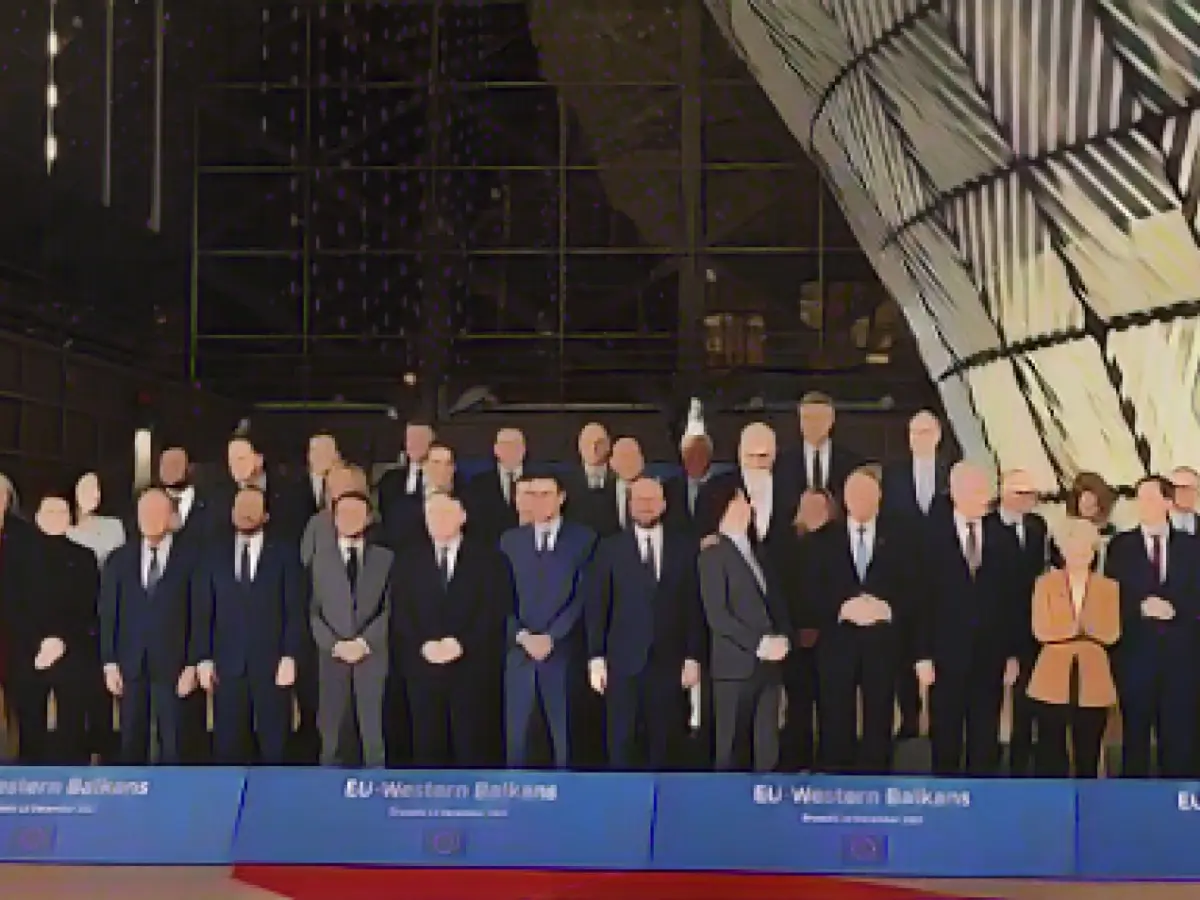Diplomacy: Baerbock Sheds Light on EU's Western Balkan Integration and Europe's Security
Hoping to boost Europe's security in the wake of the 2-year-long Ukrainian conflict, German Foreign Minister Annalena Baerbock advocates for the full integration of the Western Balkan nations. During her Slovenian visit, she emphasized the strategic importance of accommodating these countries, including Albania, Bosnia-Herzegovina, Kosovo, North Macedonia, Montenegro, and Serbia, into the EU, affirming that this is a matter of Germany's own security interest.
"It's imperative that Western Balkan countries find a home within our European Union," Baerbock stated. "In the face of Russia's imperialistic ambitions in Europe's heartlands, we can't afford to overlook any grey areas."
A swift and decisive EU is paramount, Baerbock insists, to confront various crises and conflicts unfolding in Europe's immediate vicinity. The transformation of the EU into an efficient security anchor is required to safeguard the continent's well-being and future. Progressive reforms for the countries aiming to join the EU family will serve as a stepping stone towards accelerating their admission into the Union, while the EU must also keep its promise and advance with the enlargement procedure once preconditions have been met.
Western Balkan Countries: Progress Towards EU Integration
The six Western Balkan countries are presently at various stages of integration into the EU with four of them (Serbia, North Macedonia, Montenegro, and Albania) currently in the process of accession negotiations. Bosnia-Herzegovina is labelled as a potential candidate, while Kosovo is still working to secure this status.
Baerbock's visit to Slovenia will likely focus on refining immigration policies and discussing the role of emerging conflicts in the Middle East. Slovenia will continue to serve as a non-permanent UN Security Council member for the next two years, commencing in January.
Fostering Climate Crisis Mitigation and Disaster Prevention
Addressing the devastating floods that ravaged Slovenia in August, Baerbock discussed the critical role of climate change mitigation in shaping the implementation of the German-Slovenian Action Plan. With the goal of addressing critical future concerns, she intends to focus on key projects related to water management, urban development, and renewable energy sources.
Criticizing Israel's Bombing of Civilian Targets in Gaza
In a separate discussion, Slovenia has issued condemnations for the Israeli military actions in the Gaza Strip. Prime Minister Robert Golob criticized Israel's disproportionate response and bombing of civilian targets, surpassing their right to self-defense.
Foreign Minister Tanja Fajon issued a similarly stern critique but with milder language, emphasizing the pressing humanitarian constraints in Gaza and expressing concerns about the conduct of Jewish settlers in the West Bank.
Border Controls to Combat Illegal Immigration
In response to the increase in illegal border crossings, Slovenia, like other Schengen countries, has implemented stringent border controls. With more than 40,000 illegal border crossings reported as of September 2023, compared to 13,000 in the previous year, Prime Minister Golob condemned fear-mongering tactics used by extremist populists to exploit migration concerns.
Despite the enactment of border controls, Slovenia continues to advocate for legalizing the status of undocumented migrants. "Turning a blind eye to the fear of migrants propagated by extremists is a misguided policy," Golob underscored.
References
Revised and restructured paragraphs:
Baerbock believed that the involvement of Western Balkan countries in the EU would bolster Europe's security, particularly against Russia, which has been engulfed in conflict with Ukraine for more than two years. During her visit to Slovenia, Baerbock emphasized the need for these states to become part of the EU in order to create a swift, decisive, and secure Europe capable of rapid action. She cited the ongoing conflicts in Europe's immediate neighborhood as a critical reason for this need. In order to achieve EU membership, reforms are necessary in countries aiming to join the union.
Baerbock's visit to Slovenia revealed that the fontaten countries - Albania, Bosnia-Herzegovina, Kosovo, North Macedonia, Montenegro, and Serbia - are at various stages of EU integration. Serbia and Montenegro are projected to be prepared for EU membership by 2025, according to the European Commission's strategy. Albania, Bosnia-Herzegovina, Kosovo, and North Macedonia are expected to be well-advanced in the accession process by 2025. Western Balkan countries are crucial to strengthening Europe's collective security and peace, and Baerbock emphasized this during her talks.
Climate change and disaster prevention were also topics of conversation during Baerbock's visit to Slovenia, due to the devastating floods that hit the country in August. Baerbock believed that addressing climate change is the linchpin in implementing projects that will progress key issues for Europe's future.
Baerbock and her Slovenian counterpart, Tanja Fajon, planned to visit a logistics center to discuss civil disaster protection in the wake of the flood disaster. Slovenia received aid from EU funds to help cope with the flood damage, which was estimated at half a billion euros.
Baerbock and Slovenia also discussed the Israeli military operations in Gaza, following Golob's condemnation of the Israeli army's bombing of civilian targets. Golob argued that the Israeli army's actions surpassed the right to self-defense. Fajon, too, shared concerns about the humanitarian situation in Gaza and criticized Jewish settlers in the West Bank.
Slovenia, like other EU member states, condemned Russia's war of aggression against Ukraine and supported relevant UN resolutions. However, with regard to migration, Prime Minister Golob drew attention to the need to legalize the status of illegal migrants, instead of using them as a fear-mongering tool by extreme right-wing populists. Schengen country Slovenia introduced border controls in October due to the surge in illegal border crossings, with more than 40,000 recorded in 2023 compared to 13,000 in 2022.





